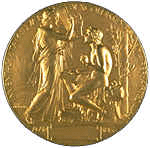 Anxiety is a tricky business. So much is affected by the smallest choice. And large choices loom ominously around life's every bend. For someone like me, that anxiety rears it's ugliest head every time a paper is due at school. Tuesday, for example, is the deadline for the second paper in my memoir class. On the first paper, as some of you have heard, I earned an A+. I bubbled over, calling everyone, shouting from the housetops.
"I'm a good writer! I am justified!"
Anxiety is a tricky business. So much is affected by the smallest choice. And large choices loom ominously around life's every bend. For someone like me, that anxiety rears it's ugliest head every time a paper is due at school. Tuesday, for example, is the deadline for the second paper in my memoir class. On the first paper, as some of you have heard, I earned an A+. I bubbled over, calling everyone, shouting from the housetops.
"I'm a good writer! I am justified!"
A week later I had another paper due in a different class... and I had to start from square one all over again. The nail biting and the quivering, the self-doubt, all back. Why doesn't my euphoria after a good paper grade last longer than the term ending when the next paper is due? It really isn't fair.
Today I discovered that in this hellishly chronic writer's limbo, I am not alone. One of my new favorite authors reassured me.
V.S. Naipaul was born in Trinidad, a small Caribbean island off the coast of Venezuela, in 1932. He was a descendent of Indian immigrants who had come to Trinidad as indentured servants and had stayed after their term of service was complete. As a boy, Naipaul knew, vaguely, that he wanted to be a writer. Admittedly these early ambitions resulted from an acute love of fountain pens and clean, lined paper. He had nothing to write about, or so he thought.
Naturally he was very bright, excelling in his early years at school and eventually earning a scholarship to Oxford. But even then, he learned everything by rote memorization. And, because English was his second language, he did not comprehend much of what he read. Imagine! He had read the classics, written essays and given speeches, but the man understood little below the surface, the intricacies that can only be understood with an excellent comprehension of the language itself.
But still Naipaul could not write. Daily he faced the blankness that destroys the ambitions of would-be authors. Not even the prestigious writing department at Oxford could stimulate his talents.
Today, he is the author of more than twenty books, both fiction and non-fiction. And he single-handedly molded the face of historical fiction pertaining to colonialism. As one who grew up without a cultural history, he began by telling the short stories of the people "at ground level". With each well-accepted story, the momentum built for the next. And soon his material, highly original and very much needed by people like him, developed into longer stories, novels.
In 2001, V.S. Naipaul won the Nobel Prize for literature.
I had never heard of Naipaul until his work was assigned in my memoir class at Davis. The most compelling, and the most encouraging, was his Nobel Lecture, "Two Worlds." He shares the heart and the pattern behind his writing, a pattern that he claims he did not even know until he looked back on his own writings decades later.
But best of all, Naipaul honestly shares himself:
"I am near the end of my work now. I am glad to have done what I have done, glad creatively to have pushed myself as far as I could go. Because of the intuitive way in which I have written, and also because of the baffling nature of my material, every book has come as a blessing. Every book has amazed me; up to the moment of writing I never knew it was there. But the greatest miracle for me was getting started. I feel- and the anxiety is still vivid to me- that I might easily have failed before I began."
I am heartened. When a Nobel Prize-winning author admits anxiety... understands the blankness... I can't help but be heartened. Now, I'm not predicting a Nobel Prize in my future. Instead, I will take a last quick lesson from Naipaul. He says that he owes his success, not exclusively to talent, but to "luck, and much labor."